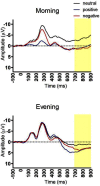Neurophysiological Processing of an Emotional Task is Sensitive to Time-of-Day
- PMID: 30210558
- PMCID: PMC5624058
- DOI: 10.5334/jcr.148
Neurophysiological Processing of an Emotional Task is Sensitive to Time-of-Day
Abstract
Previous work from our laboratory has shown that a measure of attention to emotionally-charged stimuli, the late positive potential (LPP) event related potential (ERP), distinguished neutral from emotional pictures on a baseline day, but not after sleep deprivation. Here we sought to extend these findings and address the uncertainty about the effect of time-of-day on emotion processing by testing a morning group (8:00-10:00 a.m., n = 30) and an evening group (8:00-10:00 p.m., n = 30). We also examined the extent of diurnal changes in cortisol related to the emotion processing task. Results from this study mirrored those found after one night of sleep deprivation. Compared to the morning group, the LPP generated by the evening group (who had a greater homeostatic sleep drive) did not distinguish neutral from emotionally-charged stimuli. New to this study, we also found that there was a time-of-day effect on positive, but not negative pictures. While, as expected, cortisol levels were higher in the morning relative to the evening group, there was no relationship between cortisol and the LPP ERP emotion measure. In addition, neither time-of-day preference nor sleep quality was related to the LPP measure. These findings show that, similar to what occurs after sleep deprivation, increased sleep pressure throughout the day interferes with attention processing to emotional stimuli.
Keywords: Attention; Circadian; ERP; Emotion; IAPS; LPP.
Figures

Similar articles
-
Changes in attention to an emotional task after sleep deprivation: neurophysiological and behavioral findings.Biol Psychol. 2015 Jan;104:1-7. doi: 10.1016/j.biopsycho.2014.11.001. Epub 2014 Nov 13. Biol Psychol. 2015. PMID: 25451382
-
Acute Stress Dysregulates the LPP ERP Response to Emotional Pictures and Impairs Sustained Attention: Time-Sensitive Effects.Brain Sci. 2015 May 20;5(2):201-19. doi: 10.3390/brainsci5020201. Brain Sci. 2015. PMID: 26010485 Free PMC article.
-
HIV-positive females show blunted neurophysiological responses in an emotion-attention dual task paradigm.Clin Neurophysiol. 2014 Jun;125(6):1164-73. doi: 10.1016/j.clinph.2013.09.048. Epub 2013 Dec 1. Clin Neurophysiol. 2014. PMID: 24405904 Clinical Trial.
-
Novel Augmentation Strategies in Major Depression.Dan Med J. 2017 Apr;64(4):B5338. Dan Med J. 2017. PMID: 28385173 Review.
-
Implicit and explicit categorization of natural scenes.Prog Brain Res. 2006;156:53-65. doi: 10.1016/S0079-6123(06)56003-0. Prog Brain Res. 2006. PMID: 17015074 Review.
Cited by
-
Targeted memory reactivation during REM sleep may selectively enhance the late positive potential amplitude in previously encountered negative images: preliminary findings.Sleep Adv. 2025 May 24;6(2):zpaf034. doi: 10.1093/sleepadvances/zpaf034. eCollection 2025 Apr. Sleep Adv. 2025. PMID: 40575621 Free PMC article.
References
LinkOut - more resources
Full Text Sources
Other Literature Sources

